Dr. Thiago Paixão
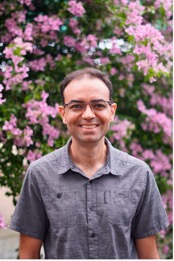
CV, Google Scholar, ResearcherID and ORCID
Email: trlcp@iq.usp.br
Office: 252, Institute of Chemistry building 2 Office
Phone: +55 11 30919150
Mailing Address: 748 Prof. Lineu Prestes Ave - Build 2 Office 261 | 05508- 000 São Paulo, SP - Brazil
Thiago R.L.C. da Paixão received a BSc (2001), MSc (2004) and PhD (2007), followed by a postdoctoral fellowship (2008/2009), all under the supervision of Dr. Mauro Bertotti at the Institute of Chemistry of the University of São Paulo. He has experience in the development of chemical sensors and electronic tongue sensor arrays aimed at solving analytical problems in environmental, clinical, forensic, and food areas. Between 2009 and 2022, he had 15 projects approved and funded by CNPq, FAPESP, ONGR, and CAPES. He was the Coordinator of the Chemistry Area at CAPES (between 2022 and 2024). He has been the President of the Postgraduate Commission of the Institute of Chemistry of the University of São Paulo between 2018 and 2022, as well as the Coordinator of the Postgraduate Program in Chemistry between 2014 and 2018. He supervised 4 master's dissertations, 10 doctoral theses, and oversaw 5 postdoctoral fellows. In early 2018, he was appointed an affiliate member of the Brazilian Academy of Sciences in the category for young scientists, and from 2024, he became an Associate Editor of the journal Analytica Chimica Acta.
Postdoctoral Research Fellows
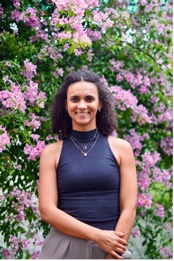
Dr. Diele Aparecida Gouveia Araújo
3D-Printing and Textile Threads-Based Microfluidic Platforms for Electroanalysis of Clinical, Environmental and Biological Samples
CV: http://lattes.cnpq.br/9325230414365726
Diele has a BSc, master's, and PhD in chemistry from the Federal University of Uberlandia. Currently acts as a postdoctoral researcher at the University of São Paulo, under Thiago Paixão's mentoring, with research focusing on developing low-cost electrochemical devices. She is sociable and loves to meet new people and practice outdoor activities.
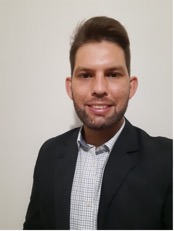
Dr. Lauro Antonio Pradela Filho
Miniaturized and/or microfluidic analytical devices for biological applications
CV: http://lattes.cnpq.br/2528349851496767
Lauro Pradela received a Bachelor’s degree (2014), a Master’s degree, and a Ph.D. in Chemistry (2020) at the Federal University of Uberlândia - Brazil. As part of the requirements to earn a Ph.D. degree, Lauro worked with Professor Charles Henry at the Colorado State University (USA) for 6 months. During this period, Lauro was supported by grants from Capes (88881.190602/2018-01) and worked with thermoplastic electrodes coupled to paper-based microfluidic devices for the determination of caffeic acid and determination of tryptamine in food samples. In general, Lauro has experience in Chemistry with an emphasis on electrochemistry and electroanalysis, working especially on the following themes: development of disposable electrochemical sensors, flow injection analysis systems with amperometric detection, and microfluidic devices. His research consists of developing new analytical devices to determine species of environmental, food, and biological relevance. Lauro is currently a postdoctoral researcher at the University of São Paulo (USP) and Brigham Young University (BYU). Lauro works with Professor Dr. Thiago Paixão and Dr. Adam Woolley, receiving financial support from São Paulo Research Foundation - FAPESP (Grant Numbers: 021/00205-8, 2022/11346-4).

Dr. Vanessa Neiva de Ataide
3D printed electrochemical biosensors modified with nanostructured metal oxides generated from CO2 laser ablation
CV: http://lattes.cnpq.br/3163916464356494
Vanessa has a BSc in Chemistry from Presbyterian Mackenzie University. She received her M.Sc. and Ph.D. degrees from the Institute of Chemistry of the University of São Paulo under the supervision of Professor Thiago Paixão. During her Ph.D., she was a visiting scholar in Professor Charles Henry's laboratory at Colorado State University. She is currently a postdoctoral associate in Thiago Paixão's group. Her research interests include electrochemical paper-based devices, carbon materials, fabrication of electrochemical sensors and biosensors using low-cost techniques, and analytical applications involving clinical and environmental interest species. She is a foodie, likes science-y stuff, and loves hiking, reading, and watching series. She is learning French on Duolingo.
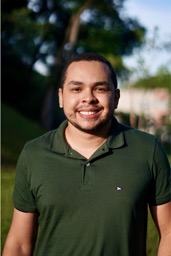
Dr. Gilberto José Silva Junior
Development of polymer-based electrochemical sensors modified with nanostructured metal oxides generated from CO2 laser ablation aiming at analytical applications
CV: http://lattes.cnpq.br/5356086205142821
Gilberto has a degree in Chemistry from Faculdades Oswaldo Cruz (2017). He received a Ph.D. in Science at the University of São Paulo (2023) under Prof. Mauro Bertotti's supervision. During this period, he worked on developing nanostructured microelectrodes for pesticide detection. He worked at Colorado State University during his internship abroad in Henry Group. Gilberto is currently a postdoctoral researcher at the University of São Paulo at Thiago Paixão’s research group. His field involves the development of electrochemical-modified sensors with nanostructured metal oxides generated from CO2 laser ablation. In his free time, he likes to play the guitar and sing.
Graduate Students

Bruno Ferreira
Development of microfluidic and electrochemical devices for forensics
CV: http://lattes.cnpq.br/9457001807341980
Bruno has an M.Sc and BSc in chemistry from the University of São Paulo. He is currently a Ph.D. student at the Electronic Tongue and Chemical Sensors Lab and under the supervision of Professor Thiago Regis Longo Cesar da Paixao at the Institute of Chemistry at the University of São Paulo. Since his master's degree, his work has aimed to use electrochemical sensors for forensic samples. His hobbies are playing and watching football in his free time, going to the cinema, and traveling to new places.
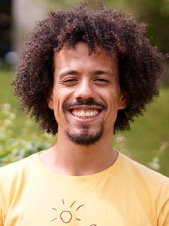
Davi Marques
Development of ePADs modified with nanostructured materials aiming at the quantification of fluoroquinolones in pharmaceutical, food, and clinical samples
CV: http://lattes.cnpq.br/4224628149807678
Davi has a BSc and MS in chemistry from the Federal University of Juiz de Fora. He is currently a Ph.D. candidate under the supervision of Professor Thiago Paixão at the Institute of Chemistry, University of São Paulo. Davi’s research focuses on developing and characterizing electrochemical sensors using laser carbonization for electroanalytical applications. Beyond his scientific pursuits, Davi is deeply interested in human subjectivity and its social, political, and academic implications. In addition, he is an enthusiastic CrossFit practitioner.
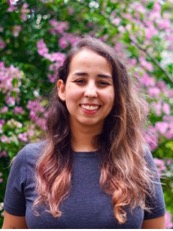
Debora Nascimento Medeiros
Hybrid electronic tongue aimed at beer discrimination
CV: http://lattes.cnpq.br/7738613678288639
Débora has a bachelor's degree in chemistry from the Federal University of Goiás and is currently pursuing a Master's degree in the area of electroanalytics at the University of São Paulo under the supervision of Professor Thiago Paixão. Her research involves beer discrimination using an electronic tongue with an array of electrochemical sensors and contaminant detection from the sample fingerprint obtained through cyclic voltammetry. She is curious and clumsy in equal measure, perhaps a terror of delicate devices, but she is dedicated to scientific advances and loves debating concepts, theories, and results. Also she is an aspiring poet and ballroom dancer.
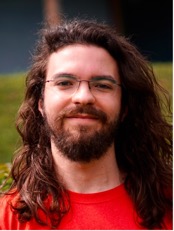
Fernando Amaral Fernandes
Development of portable electrochemical devices modified with carbonaceous materials and metallic nanoparticles
CV: http://lattes.cnpq.br/8925177450410362
Fernando has a BSc in Chemistry from the University of São Paulo (2021) and several other specializations on Python and Statistics from University of Michigan (Coursera). Currently a PhD student with a passion for applying statistics and programming to solve research problems. He also has an innate curiosity aimed at physical chemistry and technology. He is an avid gamer and climber who also has an interest in music.
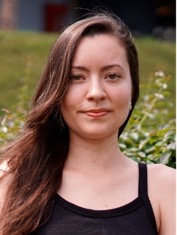
Iana Vitória Spadini Arantes
Development of flow injection system on paper
CV: http://lattes.cnpq.br/0189799546761457
Iana graduated in Industrial Chemistry (2018) from the Federal University of Uberlândia. She is currently pursuing her Ph.D. at the University of São Paulo under the supervision of Prof. Thiago R. L. C. Paixão. In the meantime, she completed her 6-month internship abroad in Prof. Craig E. Banks's group at Manchester Metropolitan University (UK). Her fields of interest include electrochemical sensors, flow analytical techniques, and paper-based and 3D-printed devices for forensic and environmental applications. In her free time, she enjoys visiting museums and planning trips.
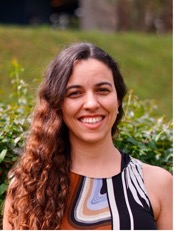
Priscila Simões Luis Silva
Development of an analytical device aimed at the detection of creatinine at the application site
CV: http://lattes.cnpq.br/5253813501709151
Priscila has a Bachelor and License degree in Chemistry from the University of São Paulo. After teaching Chemistry to High School students for many years, she is back at the University of São Paulo for her Master’s degree. She’s studying 3D printing electrochemical sensors based on copper and PLA with a CO2 laser surface treatment. She’s interested in music, reading, and getting to know new places, and her curiosity about nature is what keeps her studying.
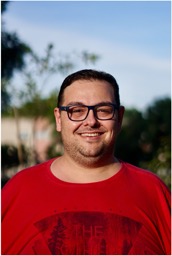
Rodrigo Marcelo Ramos
Development of paper electrochemical devices aiming at environmental applications
CV: http://lattes.cnpq.br/4150918637273747
Rodrigo holds a bachelor's degree in chemistry with an emphasis in environmental chemistry (2021) from the University of Sao Paulo. He is currently pursuing a Master's degree in electroanalytics under the supervision of Professor Thiago Paixão. He started his academic life back in 2019, still as an undergraduate student, under the supervision of Prof. Paixão and co-supervised by Drª Vanessa Ataíde, working on the development of paper-based electrochemical devices for the quantification and discrimination of pesticides in samples of environmental interest, an area that he studies to this day, moving from the use of pencil-drawing techniques to the manufacture of carbon ink-based devices. Currently, Rodrigo is dedicated to developing a new way of calibrating electrochemical devices based on a spectroscopic technique. He is an old-school nerd, addicted to technology and computer games, and passionate about books and music.

William Barros Veloso
Development of electrochemical sensors using 3D printing from conductive filaments based on carbon and/or metallic nanoparticles to detect substances of forensic interest
CV: http://lattes.cnpq.br/0757764972664899
William completed his Chemistry degree in 2018 at the Federal University of Maranhão and obtained his M.Sc. from the same university in 2021. At present, he is pursuing his Ph.D. in Chemistry at the Institute of Chemistry of the University of São Paulo under the supervision of Prof. Dr. Thiago Paixão. His research primarily focuses on 3D-printed electroanalytical devices, surface treatments, electrode modification with nanomaterials, and electrochemical sensors to detect clinical, forensic, and environmental compounds. He enjoys exercising, running, and watching TV in his free time.

Ariel Dayan
Development of wearable sensors for non-intrusive health testing
CV: http://lattes.cnpq.br/3002548763925196
Ariel Dayan, holds a bachelor's degree in Chemistry from the University of São Paulo (2023) and is currently pursuing his direct Ph.D. His project is focused on developing non-intrusive health measurement sensors, with one of his top priorities in choosing this project being its potential positive impact on society. Besides his passion for chemistry, in his free time, he enjoys bouldering and has been an amateur street magician for over 10 years.
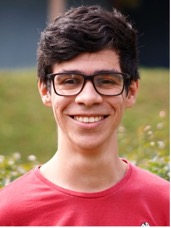
Vinicius Chaves Oliveira
Exploring 3D Printed Sensors for Electrochemical Detection of Illicit Psychoactive Substances: Investigating Electrode Geometry and Chemical Modifications for Improved Analytical Performance
CV: http://lattes.cnpq.br/0662415884296922
Vinícius has a bachelor's degree in Chemistry from the Federal University of Uberlândia and is currently pursuing his master's degree under the supervision of Prof. Dr. Thiago Paixão. His research interests lie in 3D printing and its applications in electrochemistry. Apart from his academic pursuits, he is an avid cyclist, enjoys reading science fiction and fantasy books, and is enthusiastic about e-sports.
Undergraduate Students

Rafael Silva Santos
Development of low-cost electrochemical instrumentation allied with 3D-printed sensors to formulate new field analysis methods
CV: http://lattes.cnpq.br/5037315561015967
Rafael is a chemistry student at the University of São Paulo. Currently, he is dedicated to developing low-cost electrochemical instrumentation combined with 3D-printed sensors. In addition to his curiosity about fundamental questions in chemistry/electrochemistry, he enjoys spending his free time playing electronic games and (occasionally) playing basketball.
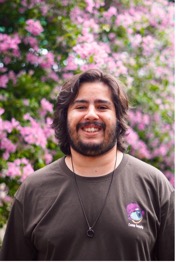
Marcos Bazani Simoes Loureiro
Evaluation of electrochemical treatment on the PLA/CB electrode for quantification of Levofloxacin in different samples
CV: http://lattes.cnpq.br/7484293364501772
Marcos is currently pursuing a Bachelor's degree in Chemistry at the University of São Paulo, where he is a member of the Electronic Languages and Chemical Sensors research group, led by Professor Dr. Thiago R. L. C. da Paixão. He is also a recipient of the Institutional Program for Scientific Initiation Scholarships (PIBIC).His research focuses primarily on developing electrochemical sensors for environmental sample analysis, particularly electrochemistry and electroanalysis. In addition to his academic pursuits, he has a passion for hobbies such as playing online games and reading.